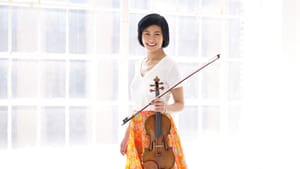Stay in the Loop
BSR publishes on a weekly schedule, with an email newsletter every Wednesday and Thursday morning. There’s no paywall, and subscribing is always free.
A trip through the solar system
The Philadelphia Orchestra presents Gustav Holst’s The Planets

The theme of inspiration linked the three works presented by the Philadelphia Orchestra last weekend. Brahms looked to the tragedies of Shakespeare and the tenets of dramatic literature when composing his Tragic Overture, while Missy Mazzoli composed her new Violin Concerto, subtitled Procession, in response to the Covid-19 pandemic. Gustav Holst harnessed the whole wonder of the solar system in his perennial favorite, The Planets.
Remembering Bramwell Tovey
If the concert itself had a uniting subject, it was Bramwell Tovey, who was to have conducted the performance. Tovey died in July of this year, after a private struggle with sarcoma.
Instead, the evening began with remembrances of Tovey from Charlotte Blake Alston, the orchestra’s resident storyteller. She recounted his generosity, especially toward students and young musicians, along with his hearty sense of humor.
One particular reminiscence stood out: while leading a Christmas concert, a piece of music was interrupted by an errant fire alarm. Once it was deemed a non-emergency, Tovey took to the piano and began improvising on the perceived pitch of the sound. He heard it as F-sharp.
The benefits of bombast
Marin Alsop, the music director laureate of the Baltimore Symphony Orchestra, took over the program in Tovey’s stead. Alsop is an intuitive musician, who often brings a narrative focus to the works she leads, but in the mighty Planets, she reached for bombast rather than a sense of programmatic cohesion. I’m not complaining.
In a way, Holst’s popular collection of linked compositions is like a group of concertos for whole orchestra. Alsop treated them as such. Individual voices stood out within each movement: the playful celesta in Mercury, the Winged Messenger, the mighty organ in Jupiter, the Bringer of Jollity. Alsop emphasized how Saturn, the Bringer of Old Age serves as a template for just about every science fiction movie soundtrack in the latter part of the 20th century.
The Women of the Philadelphia Symphonic Choir brought a spectral hush to their wordless solo lines in Neptune, the Mystic. After so much forceful music, it was a pleasantly tranquil way to end this traversal of an enduring concert-hall classic.
Mazzoli’s Procession
If The Planets is classical music popcorn, Mazzoli sought to give the audience a full meal with Procession. She composed the bulk of the work while living in Sweden at the height of the pandemic—in a cottage once owned by Ingmar Bergman, no less—and the titles of each of the work’s five movements refer to rituals performed during the Black Plague.
The emotions engendered by the 20-minute composition ranged from tense to uncomfortable to hopeful. The endless string of portamentos in the first movement, “Procession in a Spiral,” seemed to mimic the mounting dread as the realities of the pandemic set in. Violinist Jennifer Koh created a maximal sense of unease in her handling of the solo line.
At times, the orchestra subsumed the violin wholesale, as if to remind the listener that the effects of illness can overtake even the strongest individual voice. At other times, the soloist breaks free and creates an aura of optimism for the future. The moniker for the final movement, “Procession Ascending,” gives a clue as to how we’re supposed to come away from the music: with a sense of better days ahead.
Next to the brawn of the Holst and Mazzoli’s intellectual searching, the Tragic Overture, though well played, came across as perfunctory. The concert’s true starting point came in a moment of silence for the orchestra’s departed friend.
What, When, Where
The Planets. Music by Brahms, Missy Mazzoli, and Gustav Holst. Philadelphia Orchestra. Marin Alsop, conductor. Jennifer Koh, soloist. Women of the Philadelphia Symphonic Choir. November 17-19, 2022, at the Kimmel Cultural Campus’s Verizon Hall, 300 S. Broad Street, Philadelphia. $10-$179. (215) 893-1999 or philorch.org.
Accessibility
Masks are optional.
The Kimmel Cultural Campus is an ADA-compliant venue. Wheelchair seating locations and loose, upholstered seats are available in the Perelman Theater, and can be purchased online.
Sign up for our newsletter
All of the week's new articles, all in one place. Sign up for the free weekly BSR newsletters, and don't miss a conversation.

 Cameron Kelsall
Cameron Kelsall